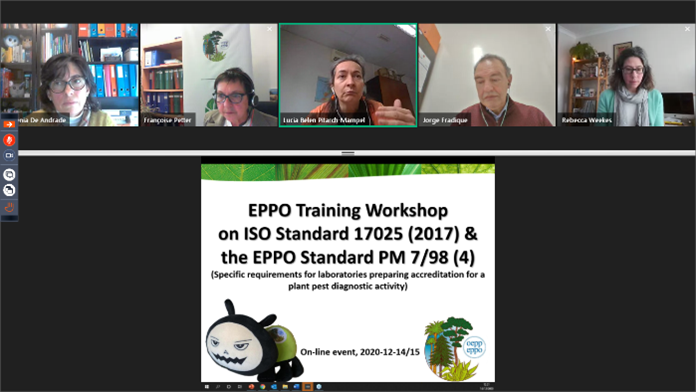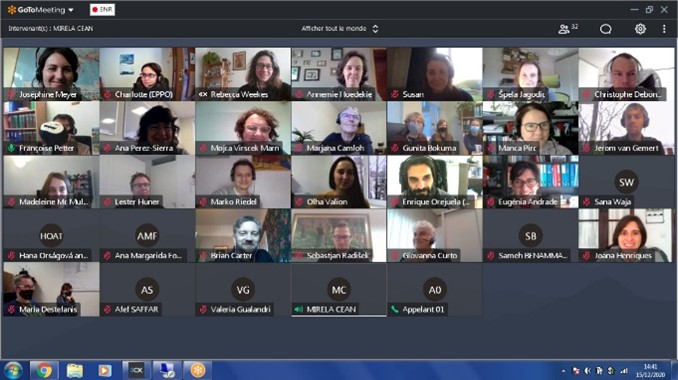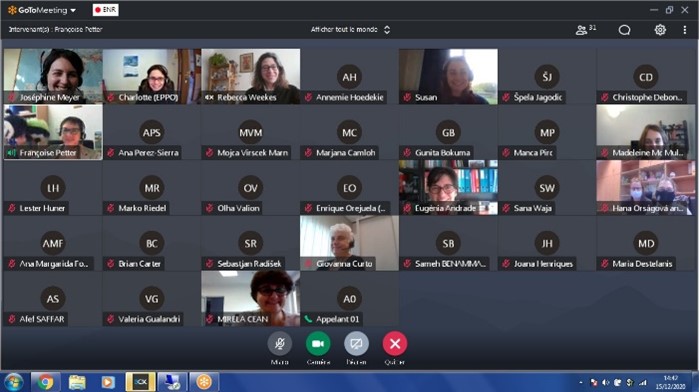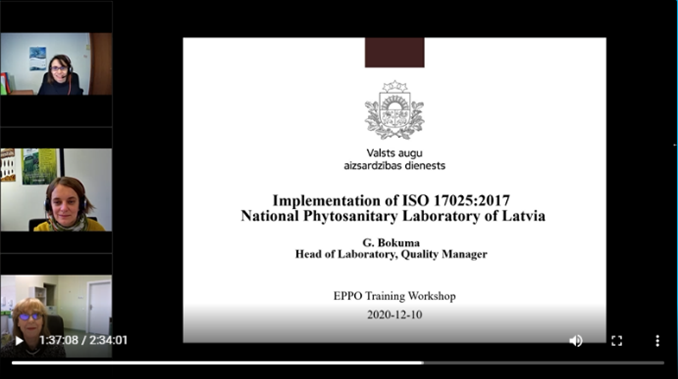
EPPO Training Workshop on ISO Standard 17025 (2017) and PM 7/98 (4)
Online event, 2020-12-10/15




This workshop was originally planned in Portugal (Oieras) in March 2020 but had to be cancelled due to the Covid-19 pandemic. Given the importance of this topic for the laboratories of the region, the EPPO Secretariat and the organizing team decided to organise it online. The EPPO Secretariat thanks INIAV, for kindly offering to host the Workshop in Portugal although it could not happen. We are also especially grateful to Ms Ross (Sasa, GB), Ms Week (FERA, GB), Ms de Andrade (INIAV, PT), Ms Reisenzein (AGES, AT) and Ms Anthoine (ANSES, FR) for their excellent assistance in preparation and running the Workshop.
Workshop objectives
The objectives of the workshop were:
- To present experience of laboratories with the transition from ISO
17025 2005 version to the 2017 version - To train experts on the new requirements in the 2017 version.
Organisation of the Workshop
Introductory session:
The introductory session was aimed at participants whose laboratories have not yet undergone accreditation under ISO 17025 or did not attend the 2019 EPPO Workshop on the revision of PM 7/98 or the 4th EPPO Workshop for Heads of Plant Pest Diagnostic Laboratories. In this session, the concepts of ISO 17025 and PM7/98 were presented. Implementation of ISO 17025 at the level of a small laboratory was also shown. This session was held in the form of a webinar on the 10th of December. In total, 145 persons from 29 countries registered to the webinar and 120 joined the session. The recording of the session is available here![]() .
.
Plenary session:
The plenary session aimed at presenting experience of laboratories with the transition from ISO![]() .
.

Practical session:
Three interactive practical activities – in very small groups – were organised, during which participants were led by experienced quality managers working under ISO 17025 (2017) to brainstorm on how to identify and manage risks. Information on a fictional laboratory (located in the country of the EPPO mascot for the International Year of Plant Health) was provided in advance of the meeting. This document included general information on the laboratory (status, scope of activity, general context), organigrams, information on specific activities conducted by the laboratory, a plan of the laboratory and a staff description.
- Activity 1: Laboratories & Equipment – led by Ms de Andrade (INIAV, PT), Ms Trontin and Ms Meyer (EPPO)
During the session, participants had to identify the risks related to the facilities, equipment, and activities. They had to rate - on a scale from 1 to 5 - the severity (which would depend on the category (facilities, equipment or activities)) and the likelihood (frequency) of the risks. With the attribute values, the participants were able to rate the different risks identified. To raise the participants’ awareness on risk-based thinking, they had to choose the risks they wanted to manage. Risks rated as equal or above 20, were considered and participants had to identify management measures.
The risks and management measures identified in this activity are listed in the wrap up document (see below). In some situations, the management measures led to the decrease of the risk rating but the laboratory ran into new risks which had to be again evaluated. In other situations, the management measures completely removed the risk. During the discussions on the less severe risks, some solutions were identified before the risk analysis step. Comparing the values attributed to severity and likelihood highlighted the need to involve as many collaborators as possible to achieve a consensus. Risk identification, evaluation and treatment depend very much on personal perception, the objectives of the laboratory, scope of activity, and other factors. It was noted that it is important to be proactive and anticipate new risks.
- Activity 2: Staff & Competence – led by Ms Ross (SASA, GB) and Ms McMullen (EPPO)
In this session, participants were randomly allocated a role as a member of staff in a fictional laboratory (each participant selected a card which was then removed to reveal a character).

For each person, their role, competence, type of contract along with other details about the individual were given. Participants had to consider what risks for the laboratory could be linked to this person. They then were asked to suggest mitigation measures for these risks. Other participants and the session leader also helped identify risks and possible solutions. The full table of risks/solutions identified for each staff member is available in the documents below (Wrap up activity 2).
The types of risks identified involved impartiality, confidentiality and competence. Mitigation measures were proposed for all the issues identified. The session leader then explained how these link to the relevant sections in the new ISO Standard 17025 (2017) (clause 4.1 on Impartiality, clause 4.2 on Confidentiality and clause 6.2 Personnel).
The participants also discussed the consequences of the COVID crisis on staff and competence in their own laboratories and how they dealt with the issues arising.
- Activity 3: Diagnostic Process - cancelled
Unfortunately, this activity had to be cancelled due to last-minute unavailability of the trainer. The EPPO Secretariat will try to reschedule it in early 2021.
Participants were meant to look at a whole diagnostic process occurring in their fictional laboratory and consider tools to help address risks that could occur during this process at an operational level.
- Activity 4: Organization – led by Ms Weekes (Fera, GB) and Ms Petter (EPPO)
In this session participants had to consider how to address risks and opportunities on a strategic level.
Risks linked to the laboratory being part of the growers’ association were discussed (risk of pressure on the laboratory by growers, sources of funding). In order to mitigate the risks experts considered that written declarations regarding confidentiality and impartiality were needed and staff should be trained on those aspects. Salaries of the staff should be independent from the volume of activity. Contracts between the growers’ association should be very clear. To ensure confidentiality, anonymization of samples entering the laboratory should be established.
The risks of information technology being maintained by the union of seed producers (e.g. potential access to confidential information) was discussed and solutions to mitigate those risks were identified (policy for access, audits on how data is managed). Three laboratories in Beastieland deliver the same diagnostic service, the potential risk (loss of activities to one of the other laboratories) and how to mitigate these risks were discussed (e.g. contracts should specify the volume of samples). It was noted that this could also be an opportunity (ensure continuous improvement of the laboratory, renewal of equipment and staff training). One group discussed how a change in the top management (e.g. recruitment of a new director general) could affect the laboratory (possible challenge on the way of working and priorities) but could also be an opportunity for positive change (fresh pair of eyes).
The participants also discussed the consequences of the COVID crisis in laboratories. All had to limit the number of staff onsite and plan action in case a staff member became infected. Preventing shortages of equipment or consumables was needed and, in some case, diagnostic activities had to be prioritized towards essential ones only. This also required clear and timely communication with the customers and the need to ensure that the key contact person can be reached.
- Wrap up session
The results of the different activities were presented during a wrap up session.
Presentations & documents
INTRODUCTORY SESSION - Chaired by Ms Trontin, EPPO
- EPPO activities in support of plant health: we are stronger together, F. Petter (EPPO)

- Presentation of ISO 17025 (versions 2005 and 2017), J. Fradique (INIAV, PT)

- Presentation of PM7/98, M. McMullen (EPPO)

- The experience of a small laboratory, G. Bokuma (State Plant Protection Service, LV)

PLENARY SESSION - Chaired by Ms Petter, EPPO
- Implementation of ISO/IEC
17025 2017 at National Institute of Biology (NIB), M. Camloh (NIB, SI)
- Our transition to IEC/ISO 17025 (2017) at Fera Science Ltd., B. Carter (Fera, UK)

- Phyto-flex scope at the National Reference Centre, L. Huner (NVWA, NL)

- Experience on the transition to IEC/ISO 17025 (2017) in the framework of an integrated management system, L.B. Pitarch Mampel (SGSHAT-MAPA, ES)

- INIAV’s experience with the implementation of the new edition of ISO/IEC 17025 (2017), J. Fradique (INIAV, PT)

- Possible tools to perform the risk analysis and the risk and opportunities identification and management, R. Weekes (FERA Sciences Ltd.) and E. De Andrade (INIAV, PT)

PRACTICAL SESSION
